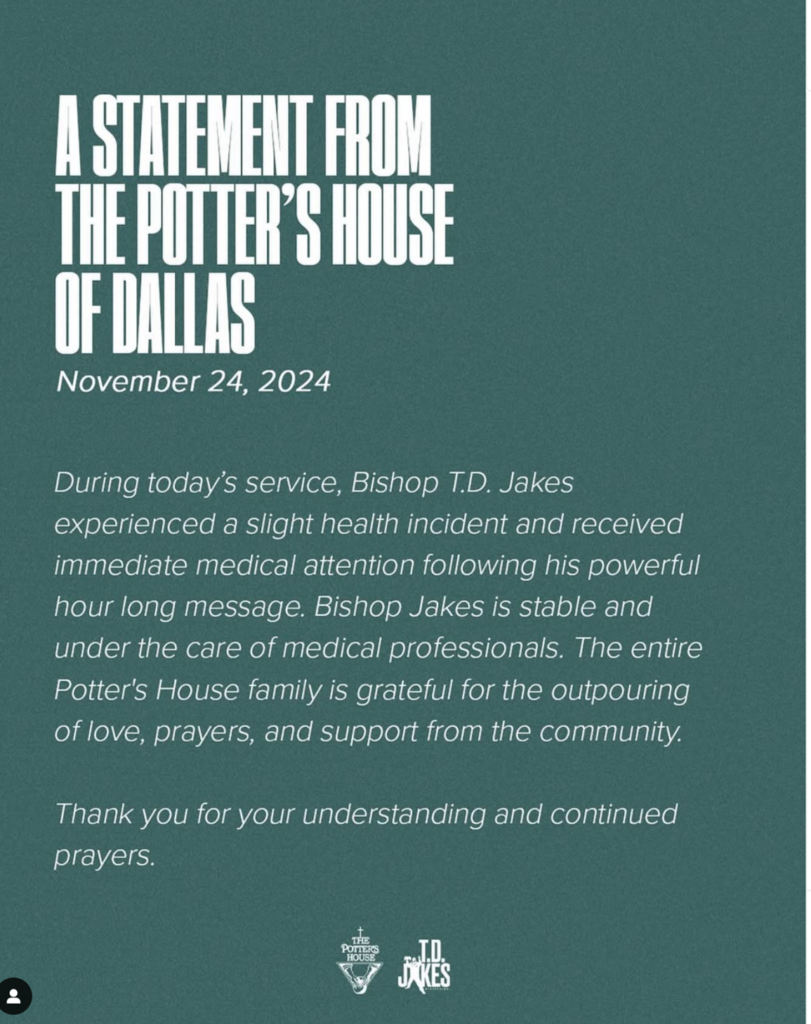
Beloved 67-year-old pastor and author, Bishop TD Jakes, was seen in footage shared on social media pausing during the sermon and shaking during the middle of him preaching on stage. Jakes, who leads the nondenominational, multicultural Christian church, received “immediate medical attention” after his hourlong Sunday sermon, according to a statement posted on his instagram account.
“During today’s service, Bishop T.D. Jakes experienced a slight health incident and received immediate medical attention following his powerful hour long message. Bishop Jakes is stable and under the care of medical professionals.”
“The entire Potter’s House family is grateful for the outpouring of love, prayers, and support from the community,” the church’s statement continued.
What Kind of Health Incident Did He Suffer?
A video clip of the health incident posted on YouTube shows Jakes sharing how much he loved preaching and wasn’t tired of his job before experiencing seizure-like symptoms on stage.
“It was a pleasure. I still love to preach. I ain’t tired of preaching. I miss you. I miss you,” Jakes told the congregation.
“Have you ever gone to a hospital to visit somebody and you thought you was going to encourage them, and they encourage you? That’s what preaching is. Like you think you’re giving out something, you’re getting back more than you gave. I love you,” he said as his hand appeared to tremble.
He then prayed Psalm 19:14.
“Now Lord let the words of my mouth and the meditation of my heart be acceptable in thy sight oh Lord my strength, and My Redeemer let him go in peace,” Jakes said.
Moments after that it became clear to his members that something was wrong and people on the stage rushed to his aid and surrounded him while his congregants immediately began praying before the livestream was disconnected.
Many who watched the incident in person and online speculated that Jakes may have had a stroke.
Stroke In Black Men
While we don’t know what specific health issue Bishop Jakes suffered, stroke is more common in Black men his age. Black men in the United States are at a higher risk of stroke than any other group of men. Black men are 70% more likely to die from a stroke than non-Hispanic white men. They are also twice as likely to have a stroke than white men.
- Stroke age: Black men have strokes at younger ages than white men.
- Stroke-related disability: Black men are more likely to have stroke-related disabilities that affect their daily activities.
- Stroke Risk factors: Many factors increase the risk of stroke for Black men, including:
- High blood pressure: More than half of Black U.S. adults have high blood pressure, which often starts at a younger age and is more severe in Black men.
- Diabetes: About 1 in 9 African American men have been diagnosed with diabetes.
- Sickle cell disease: A common genetic disorder in African Americans that can lead to stroke.
- Smoking: About 1 in 5 African American men smoke.
- Overweight or obesity: About 7 in 10 African American men are overweight or obese.
- Salt consumption: US adults, including African Americans, consume more than the recommended amounts of salt or sodium.
Up to 80% of strokes can be prevented. A stroke is a medical emergency, and it’s important to get treatment as soon as possible.
Stroke Symptoms to Pay Attention To
If you think someone may be having a stroke, act F.A.S.T. and do the following test:
F—Face: Ask the person to smile. Does one side of the face droop?
A—Arms: Ask the person to raise both arms. Does one arm drift downward?
S—Speech: Ask the person to repeat a simple phrase. Is the speech slurred or strange?
T—Time: If you see any of these signs, call 9-1-1 right away.
Note the time when any symptoms first appear. This information helps health care providers determine the best treatment.
Do not drive to the hospital or let someone else drive you. Call 9-1-1 for an ambulance so that medical personnel can begin life-saving treatment on the way to the emergency room.
What Happens When Someone Experiences a “Mini-Stroke”?
If your stroke symptoms go away after a few minutes, you may have had a transient ischemic attack (TIA), also sometimes called a “mini-stroke.” Although brief, a TIA is a sign of a serious condition that will not go away without medical help.
Unfortunately, because TIAs clear up, many people ignore them. But paying attention to a TIA can save your life. If you think you or someone you know has had a TIA, tell a health care team about the symptoms right away.

Bishop Jakes’ Family Response to Health
Founded in 1996 by Jakes, The Potter’s House has more than 30,000 members, according to its website.
Bishop Jakes’ daughter, Sarah Jakes Roberts, and her husband, Touré Roberts – who both frequently preach at the Potter’s House – said in a video posted to Instagram late Sunday that Jakes was “already beginning to improve.”
“It’s a reminder that even going into this holiday season, we need to love on the people who you hold near and dear and just take the time to be grateful for all the people God’s given you,” said Sarah Jakes Roberts.
Touré Roberts, added, “Obviously today could have been a tragic day but it wasn’t; by the mercy of God, by the grace of God, Bishop is doing well he’s recovering well, he’s under medical care, he’s strong. We’re trying to get him to sit down, he’s the strong Bishop that we know, but we really can’t thank you enough for your prayers.”









